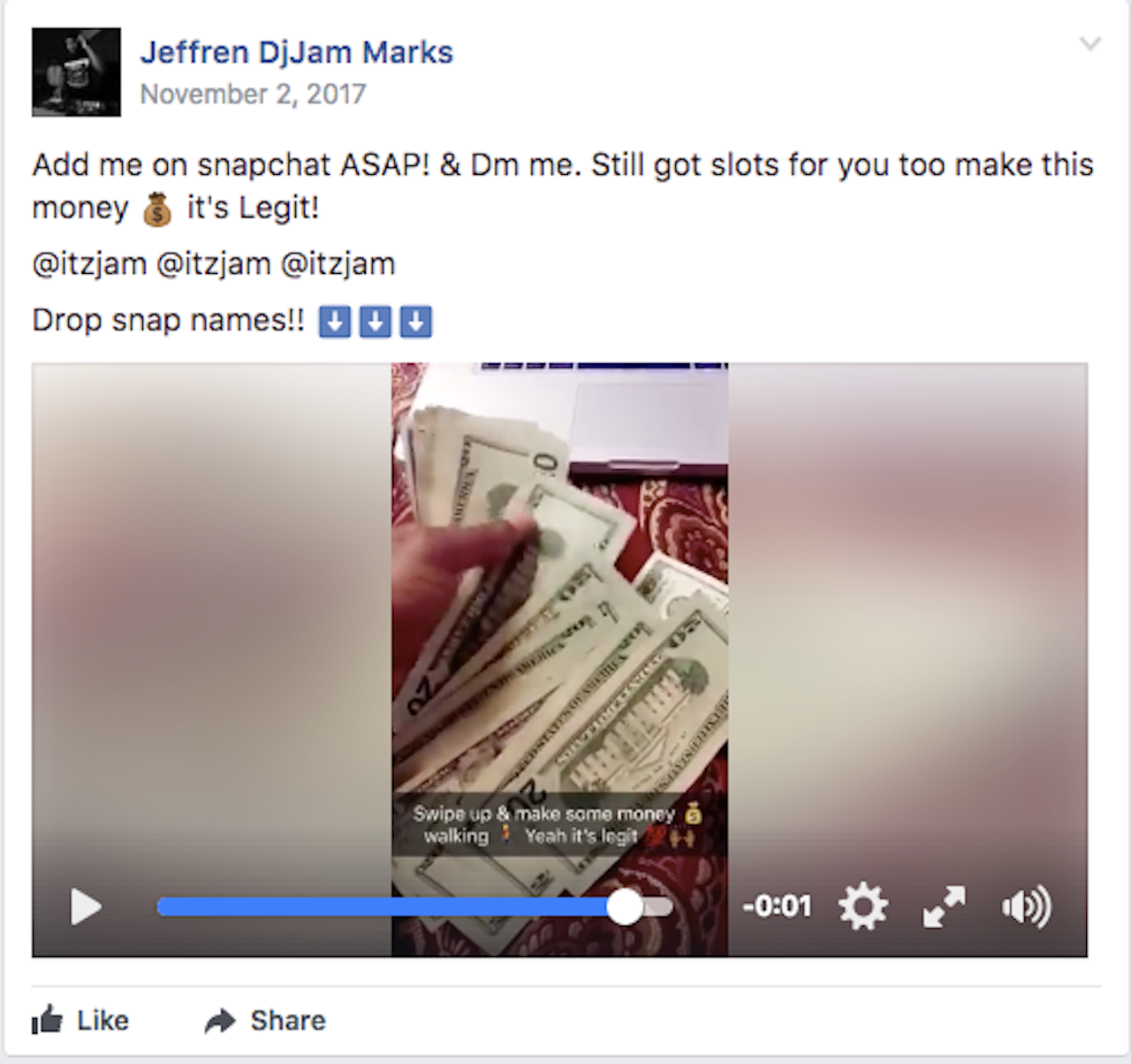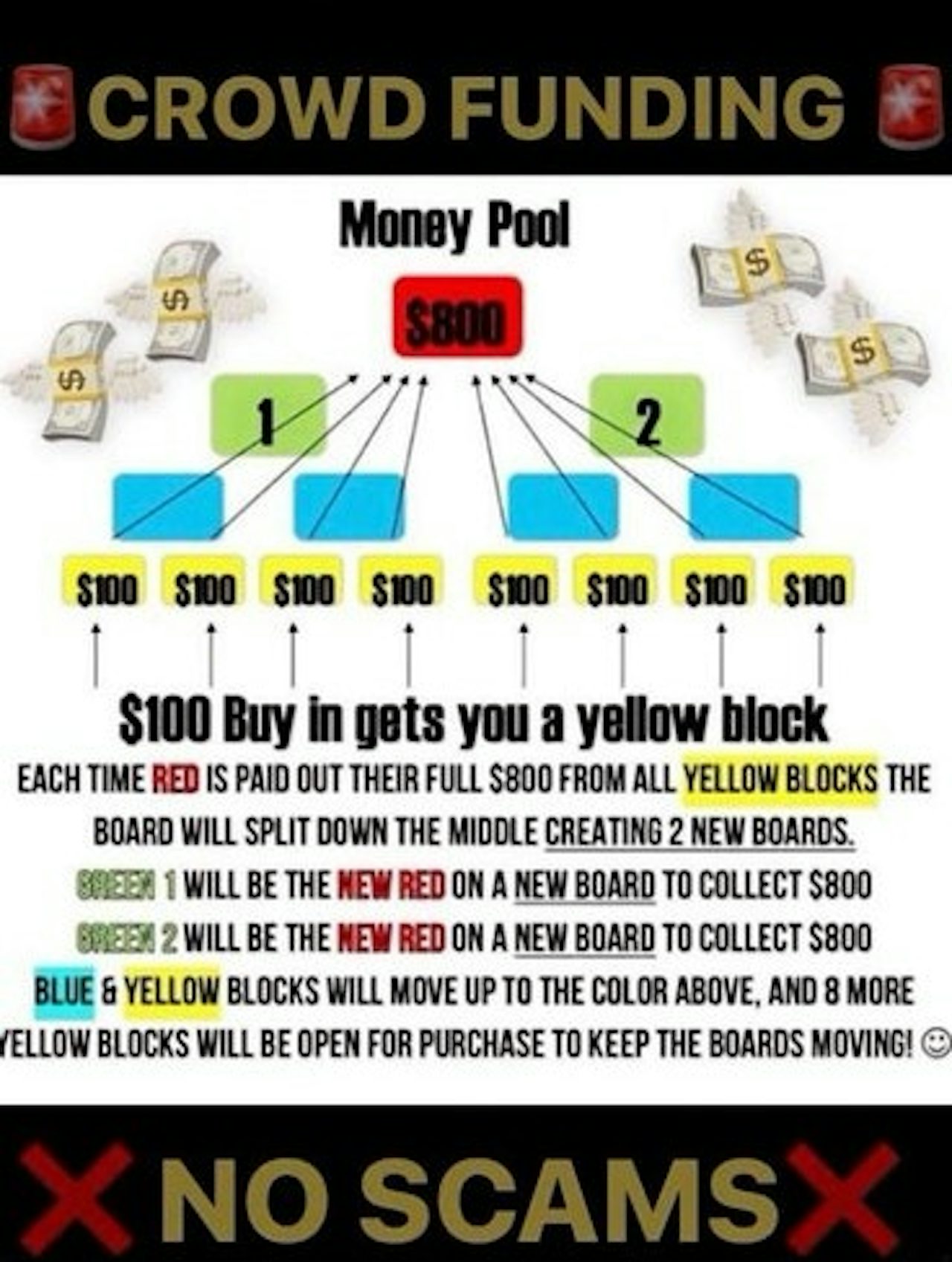There is a new meme spreading around Snapchat, and it promises to make you money. All you have to do is send a one-time joining fee to a Snapchat user using its payment system, Snapcash, and you’ll be entered into a hierarchical organization that will enable you to receive a slice of the fees from everyone else who joins after you. You can then post your own version of the sales pitch, which may describe the scheme as a form of “crowd funding” and feature rows of obviously very official-looking boxes, and distribute it to your own followers. “NO SCAMS,” these memes say. “Be ready to grab those next slots!”
If you haven’t guessed, this meme is a pyramid scheme. It’s similar to those multi-level marketing scams your one random, sort-of-friend from high school won’t stop posting about on Facebook, just without the shitty products. There’s no lipstick or Tupperware being sold, no services provided. Instead, new recruits are told they are buying into a system that will somehow turn their money into more money simply by pooling it with other users and redistributing it.
Andrew, a 17-year-old high school student from Massachuchets, uploaded a photo of the scheme to r/Scams a couple of weeks ago after seeing it pop up on his Snapchat. “It was on a few peoples stor[ies],” he told The Outline. “I don’t know who original[ly] organized the scam personally, but people were supposed to [send] cash to them through the cash app.”
Most personal accounts seem to point to this being a small scale scam. It’s unclear if anyone is actually buying in. Since the scam spreads by screenshots, it would be easy enough for a user to re-post the image without actually sending cash. However, certain variations of the scam — like this one found on a number of Snapchat Adding groups on Facebook — claim to use a central figure, known as the “Board Leader,” and a group chat filled with payment screenshots in order to keep people honest.
“From what I’ve seen from my peers and people in my inner circle, nobody’s buying into it,” said Jeremy, a 21-year-old Snapchat user from Atlanta. “I’m sure they’re aware of what it is. I also don’t know if people know it’s [a pyramid] scheme exactly, but I’m sure they can see it as something suspicious.”
We reached out to Snapchat to ask if they knew about this and haven’t received a response yet, but this wouldn’t be the first scam that has taken off on the platform. Snapchatters have reportedly fallen for sweepstakes scams, fake “Premium Snapchat accounts” where you supposedly pay to receive adult content, and various elaborate catfishing schemes.
The nature of Snapchat makes it difficult to track these scams. Unlike other social media platforms, Snapchat is a closed (not to mention purposefully ephemeral) system. Users exist in their own private spheres of content, which makes it hard to track posts as an outsider. Everything that is shared expires within 24 hours.
The closest thing to a traditional measure of activity available is the discussion occurring on other platforms, like Twitter, about what’s happening on Snap. This practice itself obviously gives a distorted representation of reality, as few people take to Twitter to do much other than to bitch and moan and make terrible jokes, yet it’s a worthwhile tool nonetheless. A quick scan reveals that there has been a serious uptick in people tweeting about “snapchat scheme(s)” (most use pyramid/ponzi schemes interchangeably, so I’m including both here) and “snapchat investment” scams.
So this is how the Snapchat scheme works. You send me $100 then I tell you to add 8 people. When all 8 give $100 that's $900 I have in total. Then I give you $800 and I keep $100. Then all 8 people you added have to find 8. I'm making money of the ones that don't.
— JT not Jeremy (@ImJustJT) December 13, 2017
Lmaooo so are you hacked or really tryna run a pyramid scheme thru Snapchat 😂😂😂 @iMauricioVidespic.twitter.com/wiUzy1i93L
— Shae (@shae_for_short) January 4, 2018
Remember when I said my niece was running a pyramid scheme on Snapchat??? pic.twitter.com/u8mS9TfaMw
— Des 🌹 (@_chismosa_) December 21, 2017
It’s this closed and somewhat mysterious nature that makes Snapchat the perfect breeding ground for these types of scams. According to data collected by Statista, Snapchat’s core user base is made up of teens and college-aged young adults (I know, shocking, right?). These users are young digital natives, who have most likely never encountered these sorts of sticky, fraudulent schemes before. Snapchat is also such an intimate platform that users may feel a high degree of trust, even toward someone they don’t know well outside of Snapchat — think like, your coworker’s niece you met at a party once or twice. When it comes down to it, few people ever really know the initial scammers personally, but they often think they do, thanks to the false sense of intimacy created by a Snapchat friendship. Watching someone’s drunken exploits, or seeing their ugly-but-funny-so-it’s-okay selfies day after day primes you to trust them. I remember when this guy got his wisdom teeth out and put a reenactment of King Kong (but with fruit instead of people) on his story, you think. I know him. So when he starts posting about a new “crowdfunding venture” — and, of course, throws in some videos of him living the high life with his newfound wealth — you just might believe him.



